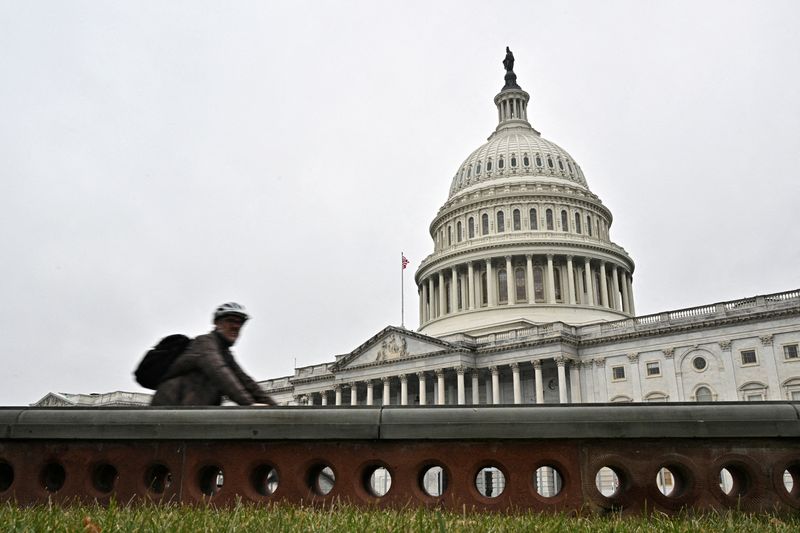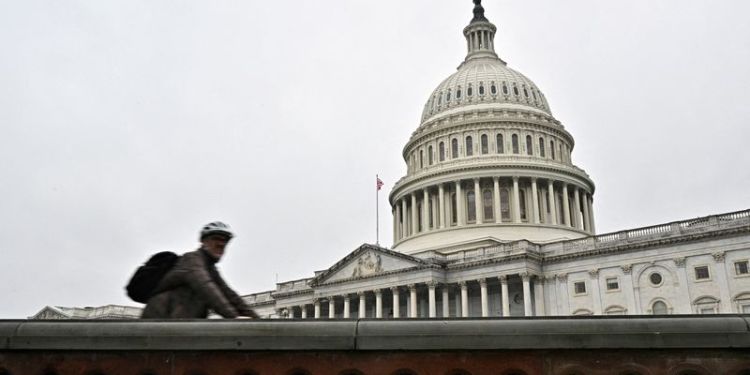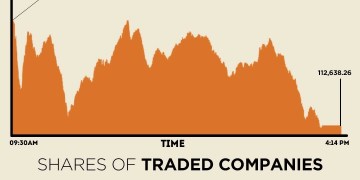2/2

© Reuters. FILE PHOTO: A cyclist passes by the U.S. Capitol building, on the morning of the first day of the 118th Congress in Washington, DC, U.S., January 3, 2023. REUTERS/Jon Cherry/File Photo
2/2
By Steve Holland
WASHINGTON (Reuters) – U.S. President Joe Biden and top Republican lawmakers will declare their positions face to face on Tuesday on raising the $31.4 trillion U.S. debt ceiling, with an unprecedented default looming in three weeks if Congress does not act.
Ahead of the 4 p.m. Eastern time (2000 GMT) Oval Office session, there were no signs that either side would immediately agree to any concessions that would head off a default as early as June 1.
Economists warn that a lengthy default could send the U.S. economy into a deep recession with soaring unemployment while destabilizing the global financial system that’s built on U.S. bonds. Investors are bracing for impact.
Graphic: World markets hunker down as US debt ceiling looms – https://globalrubbermarkets.com/wp-content/uploads/2024/08/how-investors-are-trading-the-u-s-debt-ceiling-1.jpg
The Democratic president is calling on lawmakers to raise the federal government’s self-imposed borrowing limit without conditions. Republican House of Representatives Speaker Kevin McCarthy has said that his chamber will not approve any deal that does not cut spending to address a growing budget deficit.
Past debt ceiling fights have typically ended with a hastily arranged agreement in the final hours of negotiations, thus avoiding a default. In 2011, the scramble prompted a downgrade of the country’s top-notch credit rating. Veterans of that battle warn that the current situation is even riskier because political divides have widened.
Tuesday’s meeting was likely to be the start of an increasingly fraught period, marked by uncertainty.
White House press secretary Karine Jean-Pierre told reporters on Monday that Biden plans to say at the meeting: “It’s Congress’ constitutional duty to act, to prevent default. The president is going to be very clear about that.”
McCarthy, whose party holds the House by only a slim majority, wants to tie a vote on the debt ceiling to broad spending cuts the White House considers draconian.
“Pull back on some of the spending that you seem hell-bent to do and then we can negotiate,” Republican Senator Bill Cassidy of Louisiana told CNN on Monday.
The U.S. Chamber of Commerce, the nation’s largest business association, on Tuesday urged a “swift” bipartisan agreement on the debt limit that would also include permitting reform and an agreement on discretionary spending caps.
Biden would agree to a separate discussion on the budget but not tied to the debt ceiling, the White House said.
His meeting with McCarthy will be their first since Feb. 1. They will be joined by Senate Majority Leader Chuck Schumer, a Democrat, and top Senate Republican Mitch McConnell. Top House Democrat Hakeem Jeffries will also join the talks.
The start of active talks could soothe the nerves of investors who last week forced the federal government to pay its highest interest ever for a one-month debt issue.
White House staff and aides to the congressional leaders quietly met on Friday to begin talking about the debt limit. Louisa Terrell, the head of the White House Legislative Affairs Office, was present as were representatives from the Office of Management and Budget and the National Economic Council.
Biden’s foreign travel plans and House and Senate recesses mean there are just seven days when all three parties are scheduled to be in town before June 1.
On Tuesday, Biden added a stop in Papua New Guinea on May 22 to his itinerary that includes Japan and Australia, but the addition was not expected to extend the length of his trip to Asia.
Treasury Secretary Janet Yellen on Monday said a failure to raise the debt limit would cause a huge hit to the U.S. economy and weaken the dollar as the world’s reserve currency.
Few countries in the world have debt ceiling laws and Washington’s periodic lifting of the borrowing limit merely allows it to pay for spending Congress has already authorized.
White House officials have discussed whether Biden has the authority to lift the debt limit on his own by invoking the U.S. Constitution’s 14th amendment, but Biden told MSNBC last week that “I’ve not gotten there yet” on this argument.
The 14th amendment says the validity of the public debt of the United States “shall not be questioned.” Invoking it would trigger a legal challenge.
Source: Investing.com





























